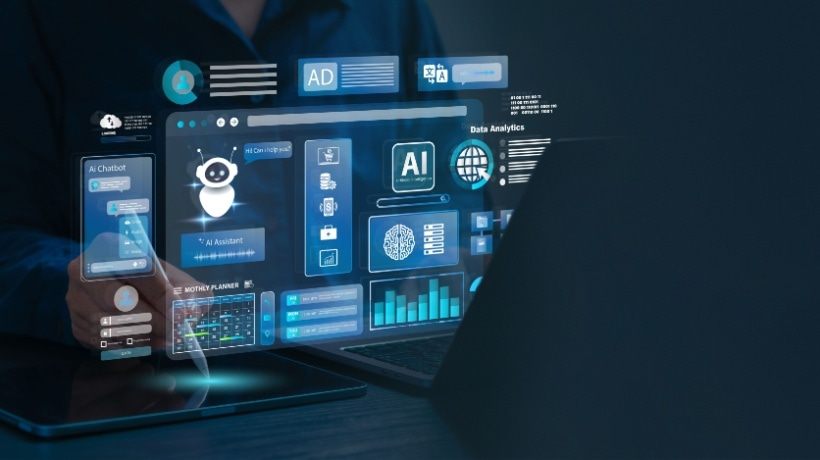
Integrating AI Tools Into Employee Learning Programs
How AI Chatbots Are Transforming Employee Learning
AI-powered tools are now integral components of corporate training solutions across industries. From intelligent content delivery to real-time performance tracking, AI is helping companies create smarter, faster, and more effective learning and development solutions.
Why AI Is Transforming Employee Learning
Employee learning is no longer a one-size-fits-all process. In today’s diverse and distributed workforce, employees expect learning experiences that are tailored to their roles, goals, and learning preferences. AI makes this possible at scale by offering intelligent personalization, predictive analytics, and conversational interfaces that engage learners in new ways. By integrating AI into custom eLearning solutions, organizations can move beyond static training modules and create adaptive, engaging experiences that meet individual learner needs while aligning with broader business objectives.
Key Benefits Of Integrating AI Tools For Employee Learning Programs
1. Personalized Learning Journeys
AI analyzes employee data, such as role, experience level, performance metrics, and past training activity, to deliver personalized content. This ensures that each employee receives relevant and timely training that helps them grow in their specific role.
2. Automated Content Creation
AI tools can assist Instructional Designers by generating course outlines, learning materials, and even assessments. This streamlines the development of custom eLearning solutions, reducing production time and allowing L&D teams to focus on strategy and innovation.
3. Real-Time Feedback And Support
Chatbots and virtual assistants powered by AI offer instant answers to employee queries, making learning more accessible and continuous. These tools provide 24/7 support, especially useful in onboarding, compliance, and technical training scenarios.
4. Data-Driven Decision Making
AI enables real-time tracking of learner engagement, knowledge retention, and performance improvement. These insights help organizations refine their corporate training solutions, identify skills gaps early, and continuously optimize training outcomes.
Real-World Applications Of AI In Learning And Development
Forward-thinking organizations are using AI in a variety of ways within their employee learning programs, including:
- Onboarding and orientation
AI chatbots guide new hires through the onboarding process, answer FAQs, and introduce company culture, reducing the burden on HR teams. - Compliance training
AI tools adapt compliance content to various job roles and simplify complex legal language for improved understanding and retention. - Leadership development
Personalized learning paths and scenario-based learning help managers develop soft skills, decision-making, and team management capabilities. - Performance support
AI-based systems offer just-in-time learning by delivering the right information at the point of need, on the job, in real time.
Integrating AI With Custom eLearning Solutions
To maximize the potential of AI in employee development, integration must be seamless and strategic. Here are a few ways companies are incorporating AI into custom eLearning solutions:
- Embedding AI in LMS platforms to personalize learning experiences based on learner behavior and preferences.
- Using AI-powered authoring tools to rapidly build and update learning content, keeping pace with evolving business needs.
- Combining AI with gamification to increase engagement and motivation among learners.
- Leveraging AI for learning analytics, turning raw training data into actionable insights for both learners and business leaders.
When combined with human-centered design and subject matter expertise, AI-powered eLearning becomes a powerful tool for workforce transformation.
Challenges And Considerations
While the benefits are substantial, integrating AI into Learning and Development solutions comes with challenges that organizations must manage carefully:
- Data privacy and security
AI tools rely heavily on employee data. Organizations must ensure compliance with data protection regulations and internal policies. - Bias and fairness
AI systems can inherit biases from the data they are trained on. L&D teams should regularly audit AI tools to ensure fairness and inclusivity. - User adoption
Employees may be hesitant to embrace AI-driven tools. Clear communication, training, and change management strategies are essential for successful adoption.
The Future Of AI In Corporate Training Solutions
AI is not here to replace human trainers, but to augment them. It enables L&D professionals to focus on strategic initiatives while automating routine tasks and enhancing the learner experience. The integration of AI into employee learning programs represents a shift toward smarter, more agile, and more human-centered corporate training solutions.
As AI continues to advance, we can expect even greater capabilities, such as emotional intelligence in virtual tutors, deeper personalization, and seamless integration with performance management systems. Organizations that embrace these innovations today will be better positioned to build a future-ready workforce tomorrow.
Conclusion
Integrating AI tools into employee learning programs is no longer optional; it’s a competitive advantage. By leveraging AI within custom eLearning solutions and broader Learning and Development solutions, businesses can deliver more personalized, efficient, and impactful training experiences. In a world where skills become obsolete faster than ever, investing in AI-driven corporate training solutions is not just about keeping up; it’s about staying ahead.
Source link




